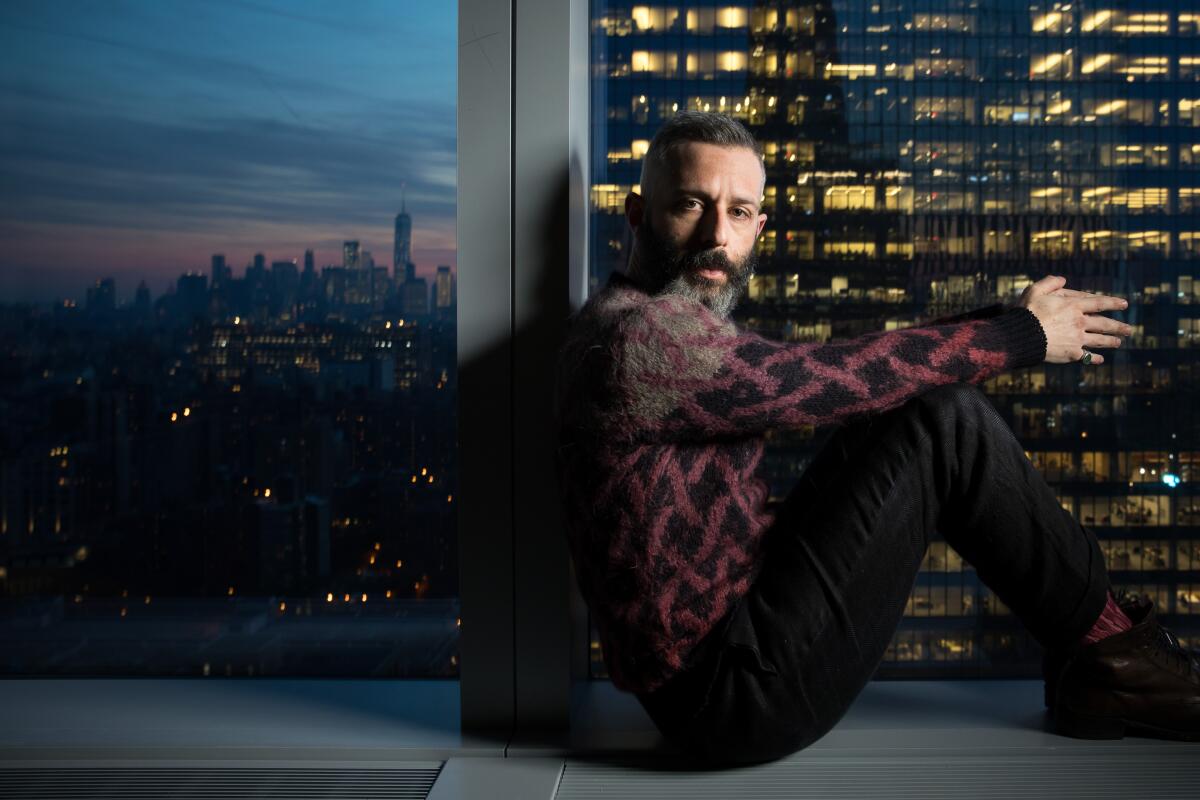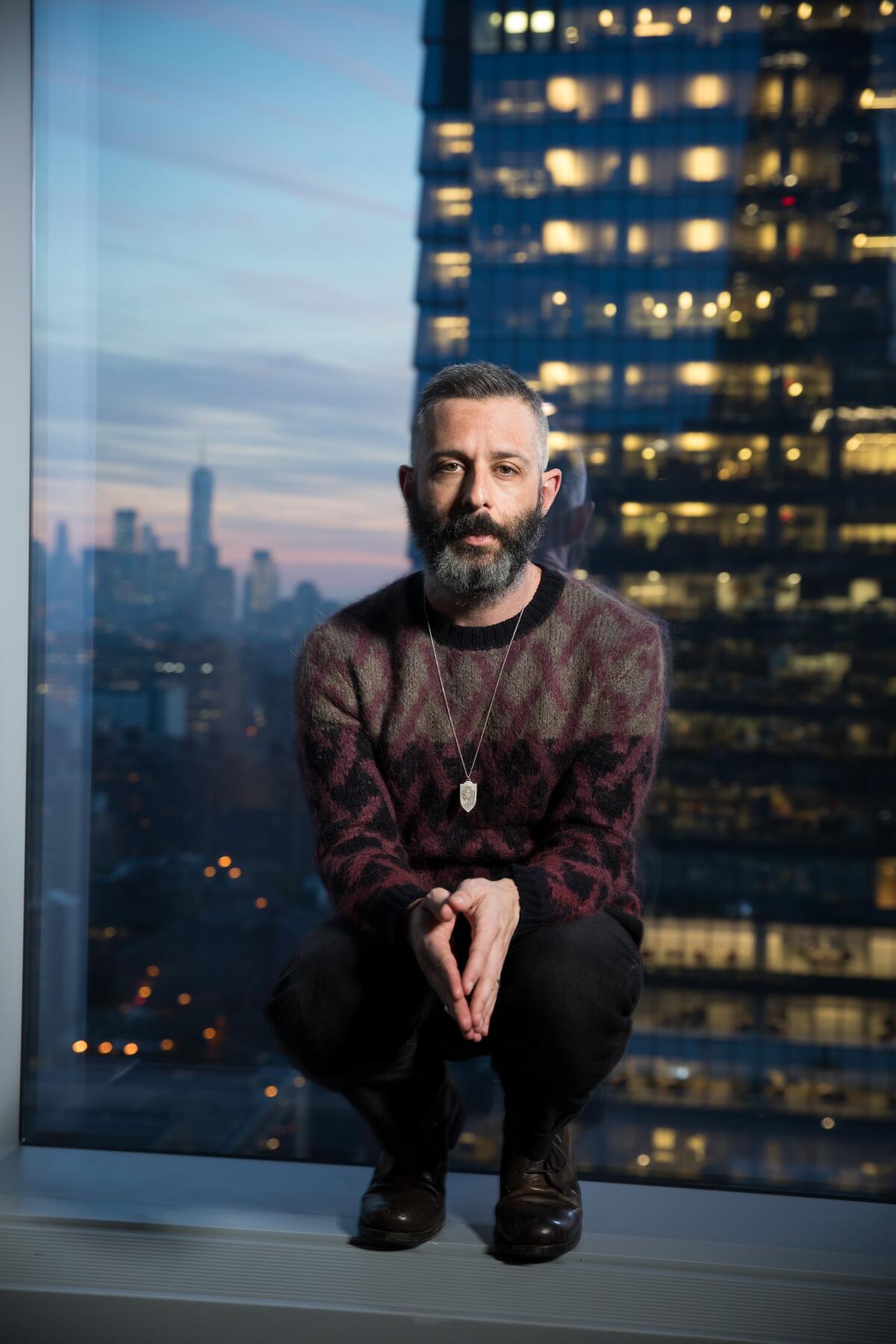As Kendall in ‘Succession,’ Jeremy Strong draws on the Murdochs ... and Shakespeare

- Share via
NEW YORK — As Kendall Roy, an heir to a Murdoch-like family media empire competing with his siblings for primacy, power and paternal approval on HBO’s “Succession,” Jeremy Strong has gone through the wringer.
In two seasons, the actor, 40, has embodied Kendall as he has been undermined by his father, tormented by his own shortcomings and misdeeds, and hollowed out by addiction. All the while, Strong has made us care about this wealthy, jet-setting mess of a man.
Sitting in a modest conference room in New York’s Hudson Yards, sporting a scraggly beard (he’s portraying Jerry Rubin in Aaron Sorkin’s “The Trial of the Chicago 7”), earth-toned clothing suitable for a Yale English-lit grad (which he is) and a silver necklace bearing his 18-month-old daughter’s footprint (his second child is due as we speak), and peppering his conversation with references to writers and artists (Balzac, Rilke, Twombly, Ferlinghetti, among many others), Strong muses on why audiences are invested in Kendall and the Roys.
“You can be human and also reprehensible,” Strong observes. “These people are wounded, damaged by their legacy. I try to bring as much empathy as I can.”
Why did “Succession” appeal to you?
I had worked with [executive producer] Adam McKay on “The Big Short.” He’s slowly making a composite picture of the maladies afflicting American society. “The Big Short” was an indictment of the banking system, “Vice” of the political culture. “Succession” felt like his attempt to talk about the cancerous families at the nucleus of the power elite running the country. Adam said the script was like “King Lear” meets the media industrial complex, and I’ve always been fascinated by the media world and the Shakespearean dramas that play out in it. People acting out of a desire, maybe misplaced, for power to fill some need in themselves felt like rich terrain.
And Kendall?
Actually, initially I was drawn to Roman [the role that eventually went to Kieran Culkin]. He felt like this bon vivant [jerk], and I thought, “Oh, I haven’t done that before.” But [creator Jesse Armstrong] was interested in me for Kendall, and after spending time with the script, I realized this was the role of a lifetime, an archetypal modern antihero. Jesse’s written this Trojan horse, where he disguises a morality tale and Greek tragedy in this shiny cellophane satire wrapping. I was interested in making Kendall and his turmoil the ballast of that.

The show’s themes seem timely.
We did our first-episode table read on election night [2016] and started the pilot the next day. The world changed. Suddenly this show felt more central because it’s talking about that intersection of politics, media, power and dysfunction — and what happens when a family with this much power also has this credo of domination, winning, success as a virtue and aggression. Then that aggression plays out on a global scale like what’s happening in our world. It’s going right for the cultural jugular.
What kind of prep do you do?
I read voraciously about dynastic families and the media. Every once in a while, reading between the lines, you get a clue, a sense of the person, the loneliness or what they are yearning for.
For instance?
In one of Michael Wolff’s books, one of the Murdoch kids, Lachlan or James, said the only language their father understood was the language of strength. That’s fascinating. What if strength is not your native language? Which is true for Kendall. Strength might be his father’s native language. Logan is a primal force: dominating, ruthless, savage and primitive. But his kids are more sensitized and damaged.
I also draw on Shakespeare. There’s a line in “Richard III”: “I am in so far in blood that sin will pluck on sin.” This idea of the erosion of any ethical core, moral boundaries that Kendall crosses again and again to get what he wants.
Also on a personal level it’s essential to bring yourself fully to a role. That’s been the biggest challenge. Kendall’s at the ninth circle of hell; the worst things you could imagine have befallen him. Trying to embody that has been difficult.
Playing Kendall must cost a lot personally.
It also gives you a lot. It’s exhilarating to lose yourself in a scene. But there have been scenes, and months, where I felt like the light had been extinguished in Kendall’s life and tried not to permit myself to have any light either. While everyone is having fun on set, I rigorously held myself to the stricture of the deficit of those things that Kendall had. Rereading “Crime and Punishment” helped me find that sense of isolation. And you take it home with you.
But you need to bring life and death stakes to the material, to treat it like it’s your life. Norwegian writer Karl Ove Knausgård, in “My Struggle,” said, “I have taken great risks by not pretending.” This is all pretend, but I want to embed within it something deadly serious and real.
More to Read
Only good movies
Get the Indie Focus newsletter, Mark Olsen's weekly guide to the world of cinema.
You may occasionally receive promotional content from the Los Angeles Times.









